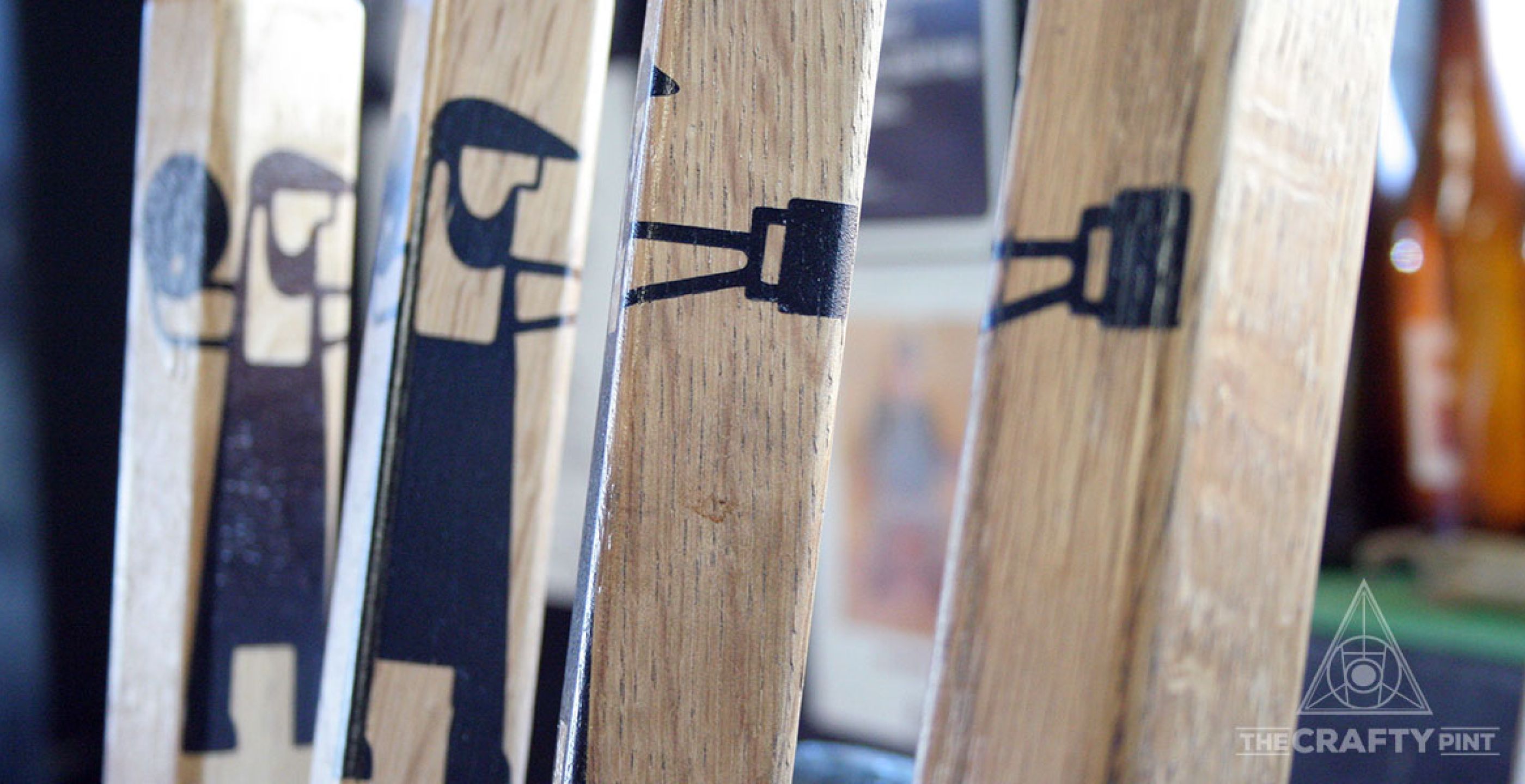This is a story of stories. Of influence and invisible threads. Mostly, though, it's about two people and their brewery.
Chris Sidwa and Andrew Fineran are not from around here but five years ago, in December 2013, they opened a brewery here, in Marrickville. Back then they had this idea that basically boiled down to them brewing more beer than anyone else. Not a greater volume, just a lot of different beers. The clue came in the name: Batch Brewing Company.
They’ve stayed true to their idea by being astonishingly prolific. Their fermenters are amongst the most fertile in the country, with hundreds of recipes having been brewed; at its peak a new Batch beer was being released every ten days. But prolificacy is only one measure. It's the smaller details that build a picture.
From their early days Batch wholly embraced the concept of promoting freshness through date stamping their beer, well before a critical mass of consumer grumbling made it something approaching standard industry practice. Their cause was always helped by a decision to sell most of their beer within a few suburbs of the brewery.
A choice to focus on local growth has seen Batch become a prolific collaborator with other businesses, none more so than the growers and suppliers that have arisen in parallel with the craft beer industry. Take, for example, the case of Voyager Craft Malt. The New South Wales maltster, and all who contribute to it, has had the opportunity to flourish alongside the abundance of new small breweries. Batch was one of the first it worked with and continues to be one of its most ardent supporters. They keep drinkers in their Marrickville bar updated with the weather forecast and rainfall in Barellan, the rural part of NSW where their malt is grown, as a reminder of the dependence their beer has on the land and the farmers who work it.
It's a progressive business, one which offsets its carbon emissions and uses a brand of toilet paper whose profits go towards buying toilets in developing nations. They give a crap. But perhaps more than anything Chris and Andrew are true believers in a small scale, full circle, local beer economy. Their brewery has become the centre of a community, and none of it would exist without the people. It is they who form perhaps the most understated but far reaching part of the Batch story.
A few small breweries had opened in Sydney in the years before Batch and far more have since, yet few on either side seem to have had anything close to the same influence in terms of propelling people into other areas of the industry – and certainly not within the same short time frame. Batch has become an incubator. The question is: why?
“Our American influence is a factor”, reckons Chris.
“A few of those individuals are American so they were probably drawn to us by the familiarity and excitement of our brewing ethos, which itself is influenced by our American upbringing. We’re promiscuous beer drinkers and have our own consumer expectation of choice and variety. We grew up watching brewers like Dogfish Head make large numbers of creative products and we do the same in our business. That’s an American brewing concept and one others around us in Sydney haven’t done.”
“Not to the same extent that we have”, adds Andrew.
“For several years we were putting out a new beer every ten days on average. At our Marrickville site, it’s probably slowed a little because we’ve really tapped into some beers that people just want to keep drinking, but we haven’t lost that passion. Which is why we’ll be opening up a three barrel brewery where the main drive is to test beers, as well as brew all the cool things we want to drink and get other people to drink.”
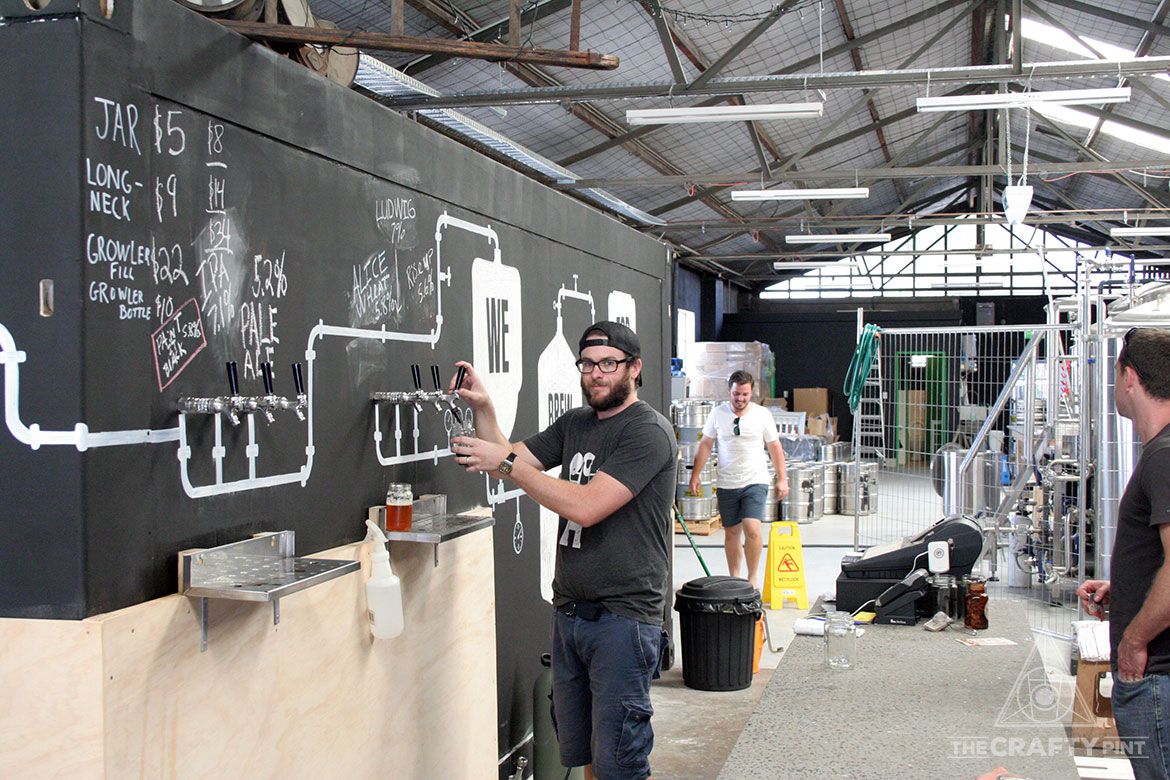
While the American model came naturally to the founders and a couple of their early employees, it was by no means a given that locals would understand or accept it. There are countless examples of businesses that have started successfully with a particular way of operating but, over time, have found the special sauce being diluted. Given they’ve managed to sustain a nurturing culture for five years, and arguably have allowed it to grow even more, it begs the question of whether it was always a deliberate part of the plan.
“Fuck yeah!” says Chris. “Well, sort of.”
“It wasn’t in our business plan, but from our first hires we always had the same strategy: hire the best and brightest, teach them, and let them grow and take the business along with them. In the modern economy employment isn’t for life – corporate greed and profit before people made that the case – but we view things a little differently.
“We gamble on everyone and teach as though they’ll be with us for their whole career. We expect people to move on and the deal we make is that they do their best while they’re with us, and in return we trust and train them and give opportunities that a more conservative management team might not offer. A good member of staff makes a business money, and the longer they’re around the more value they deliver. We hope they all choose to stay and build a career, but we don’t expect that.
"So there’s total transparency from their start date: work hard, we’ll do our best to reward you, and if you choose to move on, do so professionally and we’ll continue to support you the best we can. And they all know they better be ready to hustle if they’re going to compete against us! But we wish them all well. Play fair and work to grow the industry so we can all pay our rent."
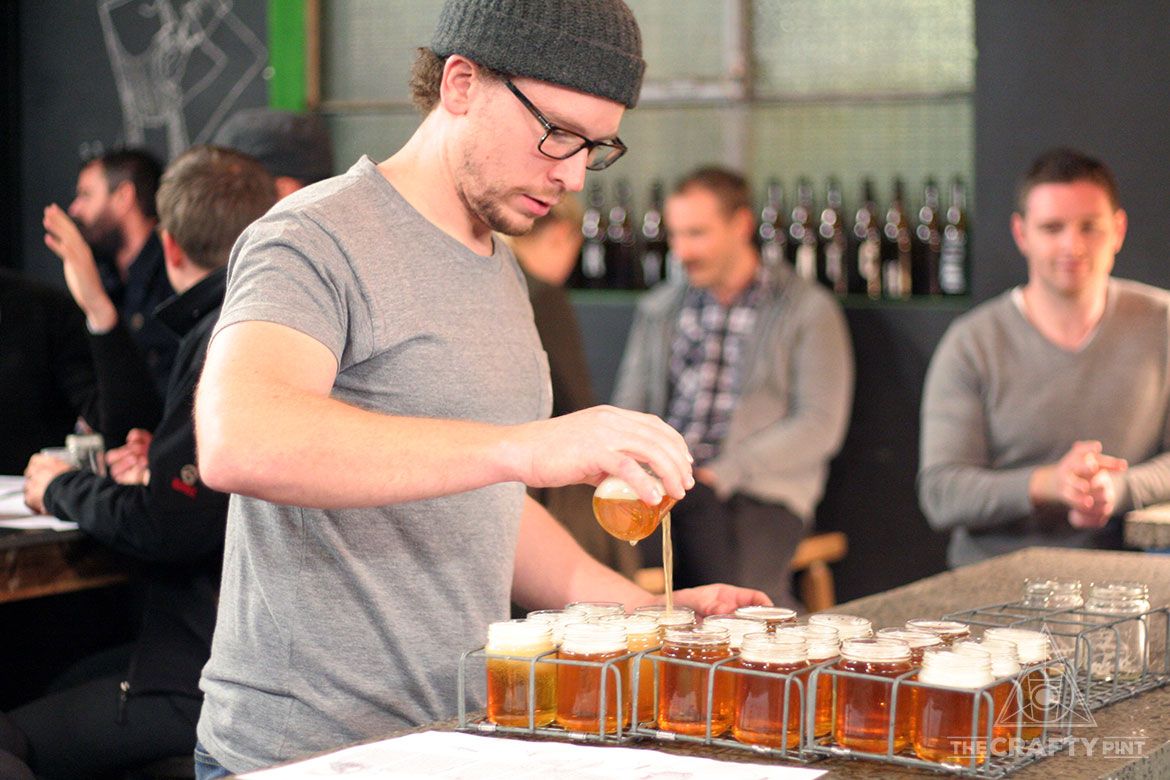
When Batch opened in 2013 the business itself was very niche within a niche industry. Depending on your personal definition, craft beer has now become part of the mainstream or is right on the cusp. Consider, for example, that many of the seemingly impenetrable bastions reserved for corporate beer brands – the likes of airports, stadiums and festivals – are increasingly places where you can be served something from a smaller or independent brewery. The change, in retrospect, has been staggering.
Within that context, we asked Chris and Andrew how they viewed things to be different now compared with where they thought things would be when they first started – not so much from a wider industry perspective, rather as it relates to their own business.
“I never thought we’d attract such amazing people," says Chris.
"Our collection of marketers, bankers, scientists, programmers, artists and entrepreneurs is what makes this place and the community around it. And that is something we set out to do from day one – build a community, make a brewery the centre of community again.”
Andrew has a far more elaborate sociological theory for why things are the way they are.
"We’re all pack animals at the end of the day and we want to be a part of a community,” he proposes.
“In the modern day and age we live digitally and globally, which is a great thing, but there’s a ‘Watch out!' that we could lose touch with those around us. Church used to be the thread that kept everyone together, but with the death of religion who’s going to fill that void? How are we all going to be connected to one another? Breweries can be that link to the community.
“Beer is for everyone and you should be able to have a beer with anyone without pretension or any airs and graces. And since people care more about what kind of beer they’re drinking now, it makes sense for the local brewery to play a role in the community, and therefore for that brewery to have employees that go on to do great things within that community."
Things have certainly come a long way from pissing contests by big brewers boasting about having the coldest beer.
Five years on, as they prepare to extend their footprint by a grand total of a couple of suburbs, a final word from the Batch founders on how it feels to have been responsible for turning one of the central cogs during one of the most exciting and influential periods in Sydney's beer history.
“It makes me happy, and proud,” says Chris.
“A healthy and responsible beer culture that people celebrate, with breweries at the centre, and everyone able to get their fair share out of it, is my idea of a perfect world.
“All of what Chris said,” adds Andrew.
“I’m blown away by the people we have working for us and even more so when you look back at all the people who have and have gone on to do great things. I love the fact that we’ve been able to play a part in it. We want to continue to play this role and progress our business and the industry. I’d love to see where we’re at in another five years!”
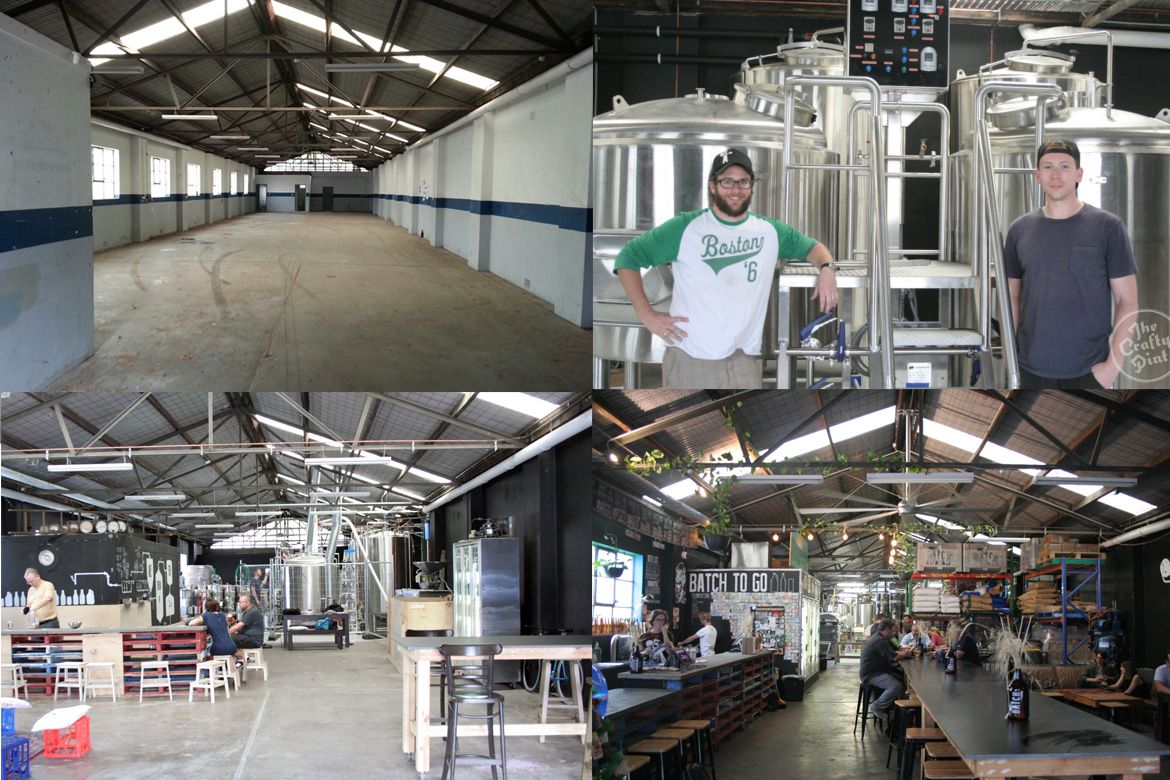
Batch Alumni
The invisible threads that run back through the Batch brewery stretch across the beer industry and well beyond, with former employees having gone on to launch a disproportionately high number of new beer businesses and artistic endeavours. While we could have included many more brewers, sales reps, operations and events people, importers and many others, what follows below is a small indication of Batch's influence.
During the process of interviewing these former Batch employees, it was notable how many people have returned to work at the brewery multiple times and how many new businesses opened or heavily influenced by former Batch people are within spitting distance of the brewery. And that, perhaps, is one of the strongest endorsements of Chris and Andrew's community ethos.
The Blender
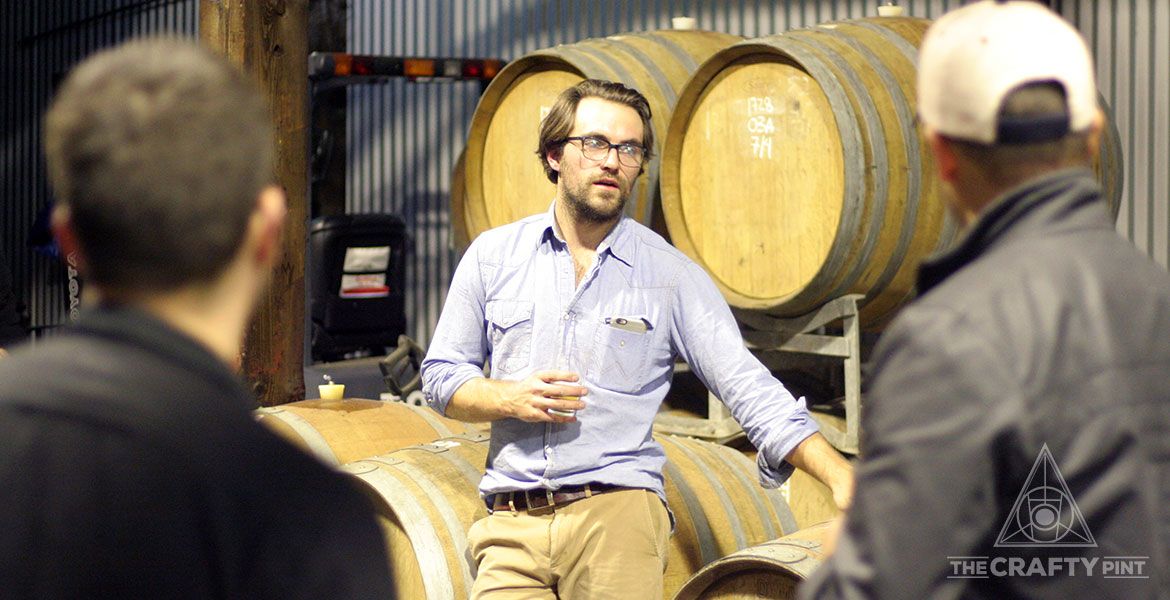
Topher Boehm was brewing at the Flat Rock Brew Cafe when he was swayed by fellow American expats Chris and Andrew to join their nascent business. His tenure there ended when he took a trip around the world to learn the art and secrets of wild fermentation. Upon returning to Sydney he co-founded Wildflower, just around the corner from Batch. He returns to the brewery often, to fill an oversized plastic cube with wort, which he loads onto a ute and drives back to the Wildflower warehouse where it’s fermented, aged in barrels and blended into some of the most highly regarded beer in Australia.
What’s your first memory of Batch?
Chris, Andrew and I were sitting at one of the outdoor tables at the Australian Hotel in the Rocks in late 2012. We’d just finished playing a game of pickup lacrosse at the courts across the road. Chris and Andrew mentioned they were starting a brewery and I asked them what it was to be called. Andrew, somewhat reluctantly – as anyone is with the name of their baby or yet-to-be-opened business – muttered: "Batch".
What was your role there?
Jack of all trades was definitely my role. I was the first hire there and started helping them build out the space pretty soon after they got it. I would drop in a day or two a week, or in between lectures, to help with all sorts of stuff; building the big long timber tables that are still serving quite well; brewing a little test batch of APA, building something else I can't remember at all. I remember a lot of sawdust to be honest. Once we were up and running from Dec 2013, I focused a lot more on making beer. We had a lot of fun those days and I made a ton of mistakes.
What attracted you to the brewery?
Chris and Andrew's willingness to explore and invent. There was no limit to what we could do. It's really a brewer's dream to be able to conceive something one week, brew it the next, make up a name along the way and drink it within a month from its inception.
Why do you think Batch is important?
I think it was a real turning point in the Sydney beer scene. The taproom there really set Marrickville up to be what it is now on a Saturday. Also, their focus on Sydney still seems to be ahead of its time. So much of their beer is sold less than ten kilometres from the brewery – that’s remarkable. Not a desire to go huge and compete on price, they focus on brand and building strong relationships with their customers, trade and direct alike.
Do you think there’s something special about the business that encourages people to achieve elsewhere in the wider beer world?
Undoubtedly. There's an entrepreneurial spirit alive in there. It goes back to the fact we can make what we want. The ceilings are only as high as you make them, in a sense.
The Brewer
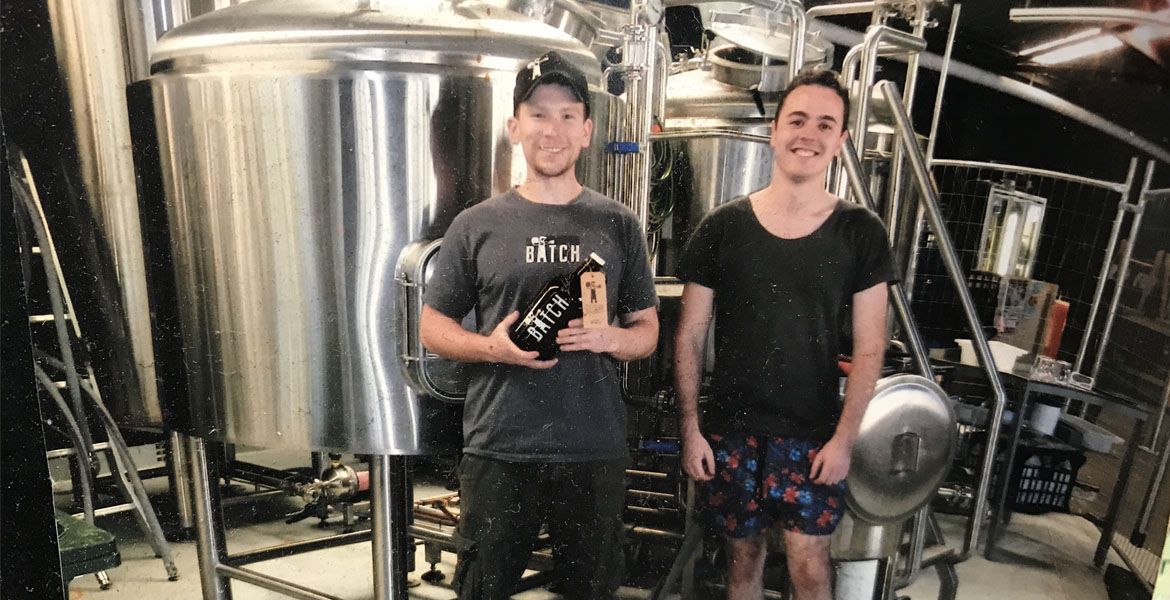
Jim Townsend was, according to the paperwork, Batch’s first formal employee – not to mention the first Aussie to get on board. Despite such a retrospectively glamorous accolade, in reality it probably meant he got lumped with doing all the stuff the other guys didn't want to do. But learning the intricacies of everything from the bottom up has its advantages, like thorough preparedness as he prepares to open the doors to his Newtown brewpub in 2019.
What’s your first memory of Batch?
First time I came across Batch was at The Welcome Hotel over at Rozelle. It must have been one of the first kegs they ever sold, because the brewery had only been open a month or two. It was their American Pale Ale, and I remember being taken aback by how hazy and bitter it was. Honestly, at the time I found it pleasantly challenging.
Today, their APA certainly remains true to the spirit of that original brew, but Batch's processes are so much more refined that the beer's quality has gone from very good to out-of-sight.
What was your role there?
When I first walked in the door I had practically zero experience under my belt. I was a homebrewer pumping out some seriously mediocre stuff, and wanted to volunteer my time in exchange for learning how to improve my own beers. So I was the shit kicker who scrubbed floors and filled bottles and moved heavy stuff around.
Fast forward a couple of years and, thanks to the patient tutelage of Chris and Andrew, I was the operations manager, responsible for scrubbing floors and filling bottles and moving heavy stuff around. The lesson is that no one is too big for any particular task.
What attracted you to the brewery?
The fact that every opinion was heard, considered and validated. There are times in business for talk and there are times where you just have to get on with the job; Batch always tried their best to ensure that the former was prioritised. It was extremely meaningful to have even the dumbest ideas of mine considered thoughtfully, and even more touching when they were actually implemented. I've never seen a workplace place such importance on teamwork and collaboration.
Why do you think Batch is important?
Batch has a clearly defined ethic, and that adherence to purpose is something that has stuck with me every day as I build my own business. In an industry that chases trends like dogs chasing cars, Batch is comfortable sticking to their primary goals: local, innovative, high quality, fresh, community beer. Those ethics have had a lasting impact on the Australian beer market, to the point where some of them are now expected of new breweries by default. But in 2013, that wasn't the case.
Do you think there’s something special about the business that encourages people to achieve elsewhere in the wider beer world?
One of the good things about being run by two seppos is that Batch will always maintain a can-do attitude. They don't stubbornly refuse to drop bad ideas, but if an idea – a beer, an event, a promotion, a piece of merch, whatever – gets the brewers excited then it's worth finding a way to make it work. Batch are problem solvers first and foremost, and their optimism and vigour mean that they will constantly push for innovative business.
The Producer
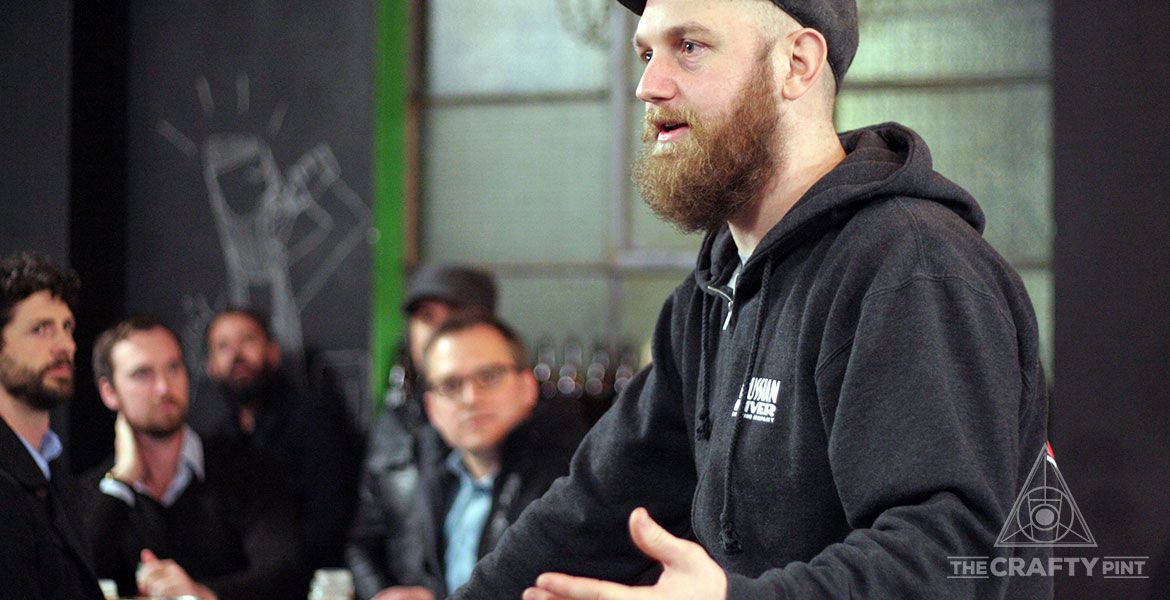
Johnathan Hepner’s approach to beer came from the music industry. The American expat worked for a major music label before becoming hopelessly inflicted by the beer bug. He worked for Batch in their early days, he left, he came back, then he left again to co-found Bucket Boys in Marrickville. Their bottleshop quickly morphed into a brewing company, then into a bar, then a distributor. It was all designed with that music promotion model in mind, one that sought to elevate the artist. Except, in this case, with beer.
What’s your first memory of Batch?
My first memory of Batch was visiting shortly after they opened. I believe at the time Andrew was behind the bar and his dad was visiting from the US and running around serving everyone snacks. I don’t really remember what beers we tried or if I enjoyed them, but what I do remember is I was really impressed that two people that seemed a lot like me had gone and built something so unique. I loved the concept from day one.
What was your role there?
Honesty, the role came about because I was looking for a career change and at the time I didn’t really have any ideas, but I knew that I enjoyed craft beer so I asked if I could come down one day a week and help out. That turned into a few part-time hours behind the tasting room bar and out doing events.
I had a few different roles at the beginning, from keg washing to filling bottles and everything in between before leaving to work for Rocks Brewing. When I came back the second time I ran the tasting room, which was the perfect space to expand my creativity and also learn how to fine tune my craft beer hospitality skills.
Why do you think Batch is important?
I think Batch, perhaps more than anyone else, has defined what it means to run a family beer business. In the beginning they did everything from the start by hand, from labels to filling bottles to the beer making itself. On top of that, they treated their staff members and their customers with importance. That really resonates with people… when you feel loved, and you feel included.
At the same time, I think they were doing something possibly more influential without even being consciously aware of it: they were training an group of people on how to run a beer business properly, and giving people the opportunity to grow within their role at Batch.
Do you think there’s something special about the business that encourages people to achieve elsewhere in the wider beer world?
Like I said, I don’t think that it was necessarily their plan to have everyone move on into bigger and better things. What you can say is that the initial group of people at Batch: Topher, Tim, Jim, myself, Mitch were all volunteering or doing part-time at the beginning. One thing that I do know about someone that is volunteering (from my many years doing the same in the music industry) is that those people are particularly motivated, so much so that they will give away their time for free in exchange for knowledge and experience.
So, in that respect, we were all there to volunteer man hours and Batch was willing to help us grow and expand our skills. Obviously, not everyone was working for experience but that was the overall feeling. There was no clock in, clock out mentality. It was a :come in and make this thing go" kind of attitude.
Mr Festivity
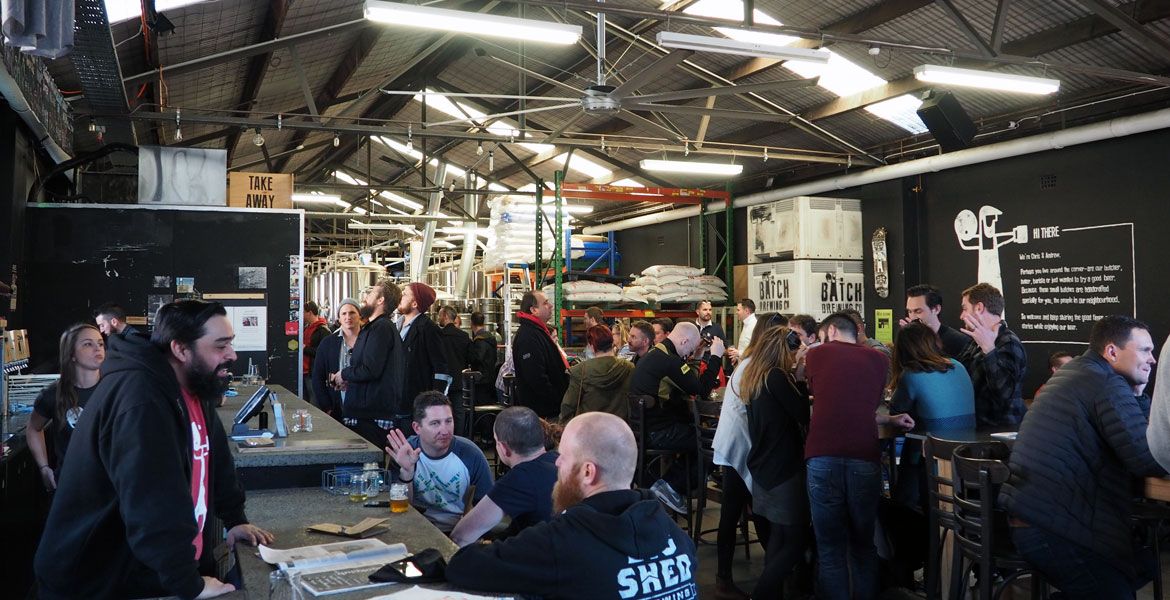
There’s barely a corner of the Sydney beer world Liam Pereira hasn’t touched. He’s worked behind bars, at bottleshops, helped launch a beer event business, co-hosts the Sessionable podcast. guided tours, studied – then taught – at the Institute Of Beer, become a Certified Cicerone and been a driving force behind Sydney Beer Week. At some point in between all that he did a stint running Batch's tasting room, which he evidently enjoyed because, since responding to the questions below, he’s moved back to Batch to manage their events and both tasting rooms.
What’s your first memory of Batch?
My first interaction with Batch was when I was managing the Camperdown Cellars Parramatta Road store. Andrew came in to see me and we chatted about the brewery, how Chris and him started, and I think I ordered beers off him. This was when they still spray painted the Batch logo on each bottle with a stencil.
I remember saying to Andrew that must be a pain and asking how long before they’d move to labels. He was very confident it was sustainable. They now have labels.
What was your role there?
I was working behind the tasting bar in the brewery. I’d just finished up a full-time job and I was sitting in the brewery having a few beers. The guys hit me up and asked if I wanted to do some shifts behind the bar.
I loved being able to chat with everyone about the beers. I also got to learn a lot during my time there, being a general pain in the arse to the brewery team, asking them a million questions and taking up way too much of their time when they had far more important things to do.
What attracted you to the brewery?
Their constant innovation and development of new beers. It's insane to think about how many different beers have come out of that brewery.
Why do you think Batch is important?
For many reasons, but firstly they make great beer. They’re the original Marrickville brewery and, from my memory, the third Inner West brewery [after Young Henrys and St Peters Brewery] so, if you think about how the Inner West scene has grown, they’re right in the centre of it. And they’ve always been innovators.
Batch was the first brewery I knew of working with Voyager Craft Malt, using their Schooner malt, and they were one of the first Australian breweries to release a NEIPA with Juicy as Phuck.
Do you think there’s something special about the business that encourages people to achieve elsewhere in the wider beer world?
That all comes from Chris and Andrew. They’ve always had a big focus on the culture of the brewery. You’re there to work hard and do your job but you should have fun while you're doing it. They had a dream to start their own brewery and they did it. They want to help their staff reach their end goal, whether that's going on and starting their own brewery, bar, bottleshop or anything else.
The Distiller
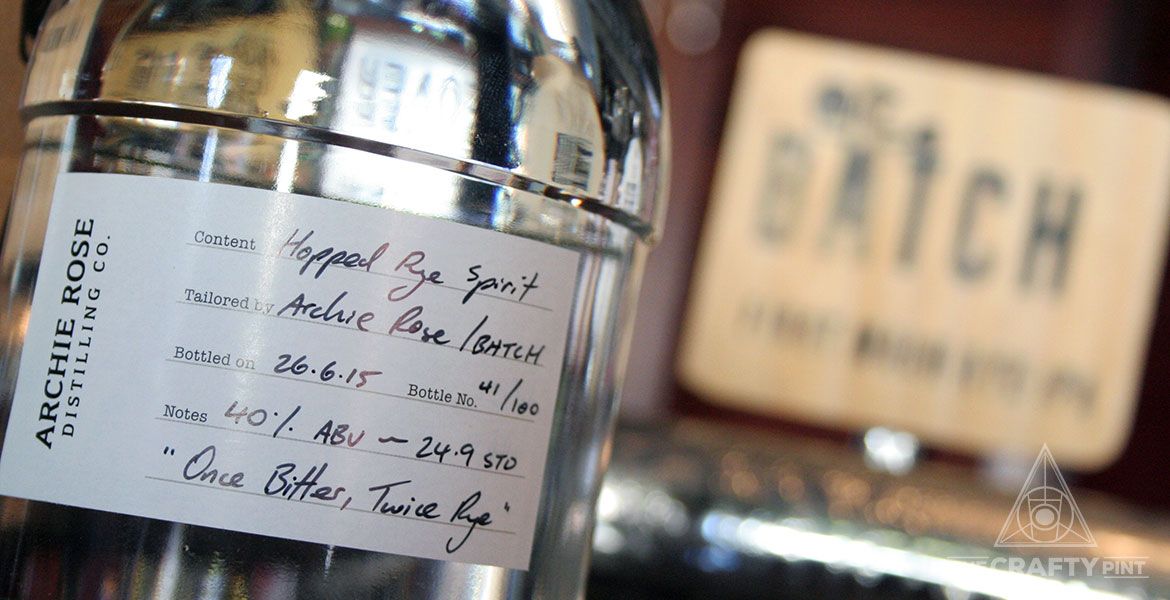
Beer is by no means the only form of alcohol experiencing a small scale renaissance. In recent years, craft spirits have been following a similar trajectory to brewing, with small distilleries opening up across the land. Shane Casey has straddled both worlds, first as an assistant brewer at Batch before moving on to become head distiller at the Sydney’s pioneering Archie Rose. In 2015, the brewery and distillery collaborated on the First Wash Rye IPA and Hopped Rye Spirit, a boilermaker with a difference (pictured above).
Shane has since gone on to become head distiller at Brix Distillers, a new rum distillery in Surry Hills, which he compares with Batch in that “it’s a similar kind of ethos. We’re really passionate about rum and want to make a comfortable space where other craft spirits professionals and enthusiasts can come and share their passion and ideas."
What’s your first memory of Batch?
The smell. Malty, biscuity, hoppy goodness.
What was your role there?
Assistant brewer. I’d been experimenting with homebrewing, so joining the team at Batch meant I had a chance to learn how to brew professionally, which I quickly learnt didn’t actually involve much brewing. For a small brewery it was mostly cleaning, packaging and rearranging stock.
What attracted you to the brewery?
I wanted to get into the industry and, after contacting every brewery I could think of, they were one of two that were happy to take me on. I ended up choosing Batch as they seemed like good guys and were small enough that I could get to learn about all aspects of production.
Why do you think Batch is important?
It’s what craft is all about. It’s a good hub for people to learn and share their knowledge and passion for brewing – a place where you really get out what you put in.
Do you think there’s something special about the business that encourages people to achieve elsewhere in the wider beer world?
I think the fact that Chris and Andrew quit their day jobs and threw everything they had at the brewery to try and make it successful, and their fantastic work ethic, is a bit of an inspiration for people to realise their own ideas and see them through to fruition.
The Writers
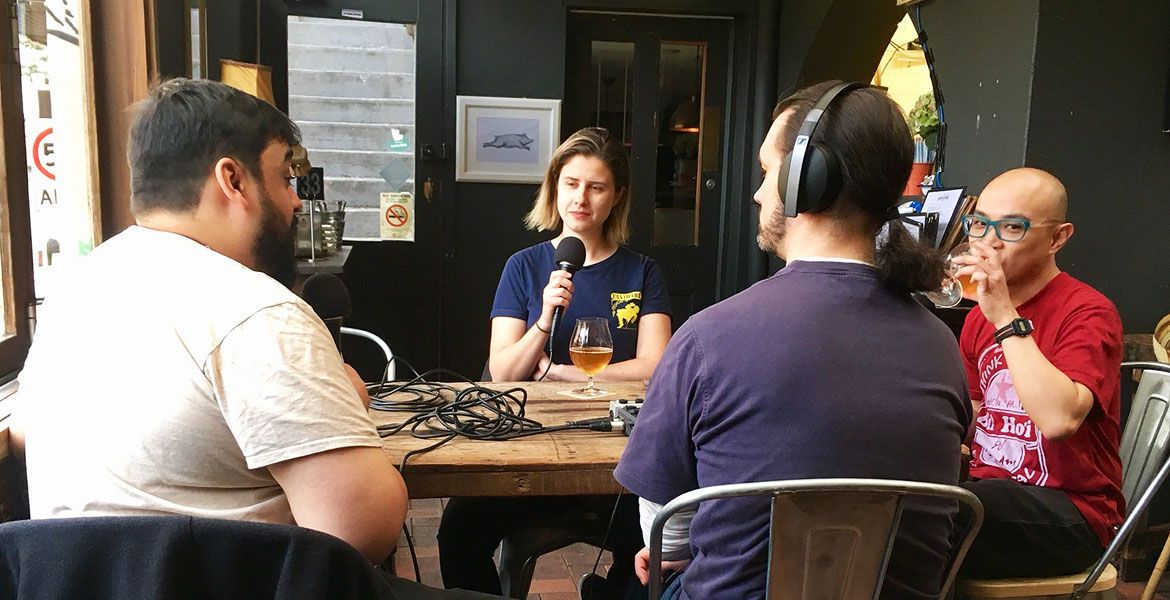
The Crafty Pint has been an indirect beneficiary of Batch’s tendencies towards finding talented people, with work at the brewery having helped provide knowledge and fodder for the writing of regular contributors Marie Claire (MC) Jarratt and Hannah Grugel.
While studying for a PhD in experimental quantum physics, MC worked part-time at the brewery and documented her exploration of the beer world via the New South Ales blog. Having moved from the UK where she’d worked at London’s Beavertown, Hannah found herself at home on Sydenham Road and began the blog Little Hop Beers.
What’s your first memory of Batch?
MC: When I first started my blog, it began as a journal of all the Inner West breweries I was visiting after moving from Sydney's [then] beer-barren North Shore. I was slowly making my way to a new one each weekend, but Chris noticed I hadn't visited Batch yet and actually extended an invitation for me to come visit, take some photos, and write about them. So I felt like an esteemed guest on my very first visit, and that feeling has never gone away!
HG: Batch was my first real Australian brewery experience. I had just moved from the UK and was looking for work in Sydney breweries. I found them online and sent off a CV, and they actually got back to me! I headed down to Marrickville, enjoyed a Withnail & I IPA with Iain and, as luck would have it, got the job.
What was your role there?
MC: I was working on the packaging line, loading bottles onto the conveyor belt of the Meheen bottler. It sounds extremely boring, but was really a prime position to watch all the goings on in the brewery – everything from milling the malt all the way down to packaging the final beer in kegs, and everything in between. I was lucky enough to work with Topher most mornings, so I benefitted greatly from his wealth of knowledge.
HG: I worked there for six months, working the bar most days, helping with packaging and lending a hand where it was needed.
What attracted you to the brewery?
MC: I'm aware of how cliche this is going to sound, but it was the people. The first time I visited, I was given a tour by Chris, shared some beers with the brewers, including Tim and Jim, then left with the very first issue of Pallet magazine lent to me by Jonathan, since he was done reading it. I felt welcome right away.
I think lots of breweries, especially in Sydney, strive to get that sense of community, but few get it right. It's not something that can be easily faked.
HG: Coming from Beavertown in London I was looking for something similar to what that was to me a few years ago; an independent brewery with a good vibe, a fun crew and even better beer.
After doing some research of breweries in the area, I was attracted to Batch because they were original, there wasn't anything else like them around, and they were genuine with it. I was also attracted to the way they brewed, with small batches every two weeks or so, as I love experimenting with beer and how they weren't afraid to take risks with their brews and try new things.
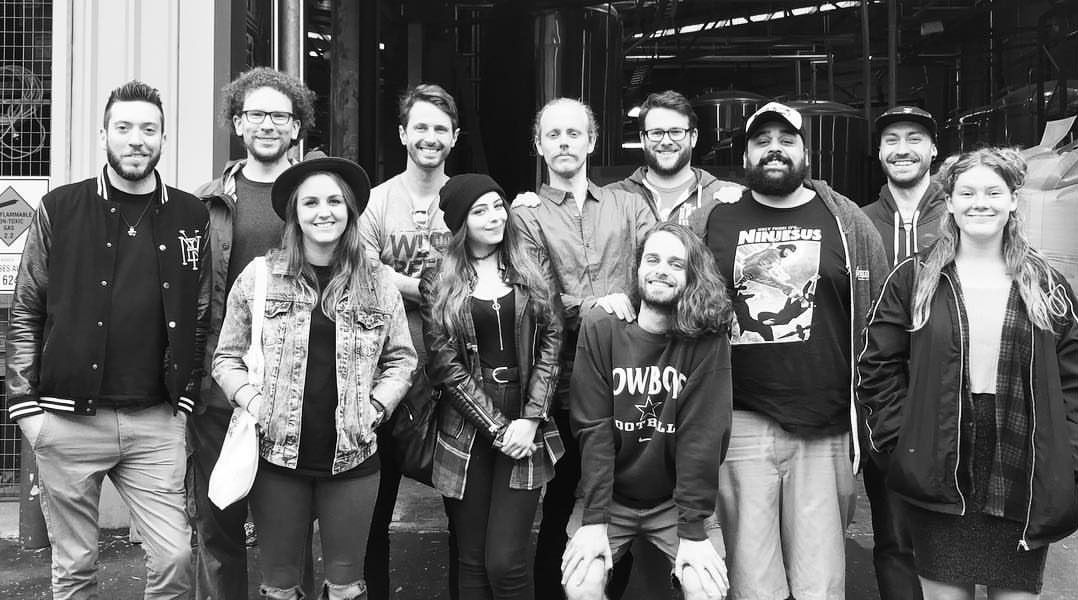
Why do you think Batch is important?
MC: I think it's important that they're constantly experimenting. It's one thing to brew and perfect a core range, and there's certainly no problem with that. To constantly be trying something new is very risky and brave, especially if it turns out to be horrible! The idea of avoiding complacency is what the beer world needs to constantly be moving forward.
HG: I think Batch is important because of their values. They've been at the forefront of the Aussie craft beer industry as I see it, and haven't been fazed by the new found competition in the Inner West. Everything they do feels like a natural step forward because you can tell Chris and Andrew really care about the impact they have on the local community and in the beer world.
Their passion for making amazing beer shines through, and they champion so many important initiatives, from environmental causes to supporting women in beer. They support local businesses, provide a welcoming, innovative and supportive space for their employees and go out of their way to showcase local artists, musicians, writers and more. And this, above anything else, is not only what makes them important, it's what makes them special and keeps people coming back.
Do you think there’s something special about the business that encourages people to achieve elsewhere in the wider beer world?
MC: Certainly! I think it stems from that encouragement to experiment – with new brewing techniques, new ingredients, new serving methods, whatever it may be. It's also about the humility. If something doesn't work out quite right it can be hard to take it in your stride, and learning to accept a failure is something that a lot of people aren't very good at. For Batch, that's just part of their business. If the beer didn't work out (which I must say, rarely happens!) or if the response isn't great, they can just accept it, learn from it, and move on. Being able to push on despite a setback is key to any successful person, or any business.
HG: I think the special thing about Batch is that it is totally unique. There are many breweries like it, but there's something different about the atmosphere in Batch, the people that are so passionate and make it what is and the ever-changing beer list that make it stand tall above the rest.
The Best Batches
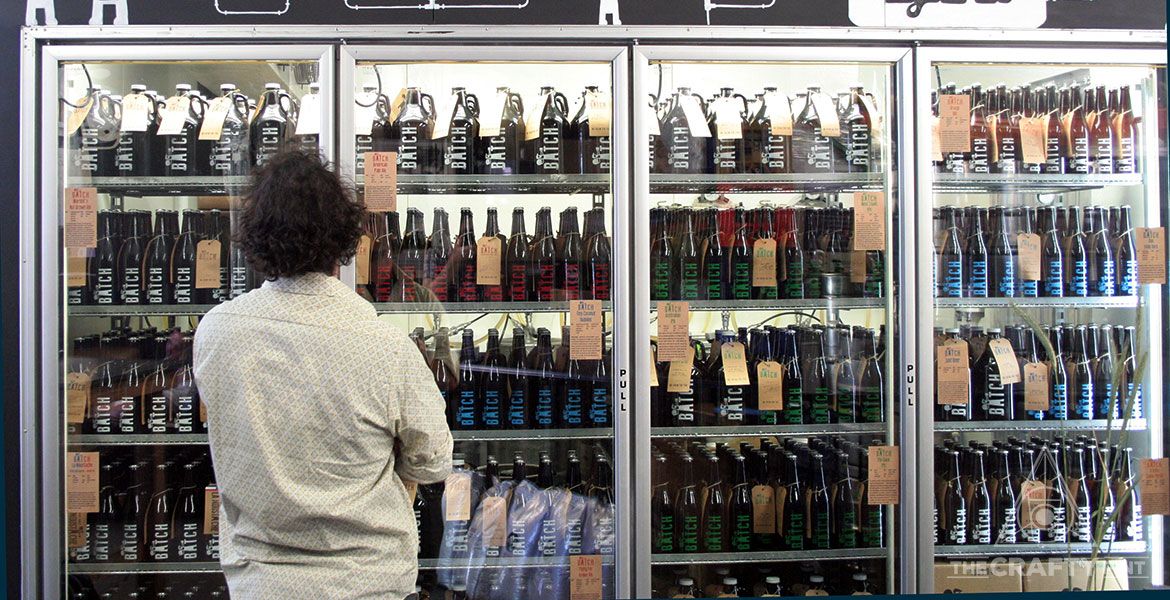
Batch has made hundreds of different beers over the years so picking a favourite is no formality. Nevertheless, as a final point of reflection we asked the alumni what single Batch beer stands out in their memory...
Topher – Elsie The Milk Stout
I love that beer so much and am so bloody proud of the brand they have made of it. It took us years to convince and educate pubs on how to serve that thing but it’s so worth it. For me, it's a great and lasting example of the value in having the producer show their customer what they want, for the better, rather than producers bending to a customers desire on price, flavour or packaging. I love seeing breweries with the gall to go against the tide.
Jim – Chapeau (Raspberry Sour Ale)
We were all so excited about making a fruited sour beer for the first time, which seems quaint now given that Batch's fruited sours are a huge part of their offering. The week we filled a bunch of champagne bottles by hand, labelled by hand, packed by hand, waited for the bottles to naturally carbonate... it was a brave new world back then.
I also remember cleaning out hundreds of kilograms of fucking raspberries from the fermenter, which took me hours and hours and hours.
Johnathan
I could do a top five batch beers that have really surprised or delighted me. In no particular order: Big Kahuna, In A Pickle, MacBatch, Chapeau, Addison Rye.
Liam – Chapeau
My first ever shift at the brewery was one of the Chapeau launch days. Besides the fact that every year it's a great beer, I love the fact that the beer is a giant thank you to all their regulars. Also, the fact it comes out just before Christmas every year means that it's part of my family Christmas lunch every year.
Shane – Jalapeño Farmhouse Ale
I think that’s what it was. It was a beer that had jalapeño in it…
MC – Dr Somes' Lemon Elixir (Lemon Sour Ale)
I distinctly remember bottling a beer one morning called Dr Somes' Lemon Elixir. I was really pissed because here was Joe Somes, going around with the "Dr" title attached to his name, and here I was, suffering through year three of a PhD. They don't give that title out for free, you know!
I'm expecting Dr Jarratt's Elixir in a few months time! But, in all fairness, Joe is a fantastic bloke and his Lemon Elixir really did hit the spot.
Hannah – Dank Jr (Summer IPA)
It was my summer favourite a year or so back, but it never came around again! It reminds me of my first summer in Sydney, and mixing it with the Chapeau to make the fabled Chadank. Good times!
Andrew – Elsie The Milk Stout & Hay-Z (New England Sour)
I don’t have a favourite per say, but I’m proud of how we’ve pushed boundaries and persevered through hard beers to make. Elsie is one of those beers due to the nitro situation. We’ve had lots of trial and error with that beer, but we’ve finally come to a great process to get it into package so it can be enjoyed at home as well as the pub.
Another one is Hay-Z as, to my knowledge, it wasn’t a style of beer that had really ever been done before… well, not to any great extent at least. We took some risks and trials, but got to a great place with that beer and I think stayed ahead of the curve on trends (although hop-wise it’s really expensive!).
Chris – American Pale Ale & Just Beer (Lager)
In golf they say you drive for show, and you putt for dough. Pash [The Magic Dragon], Juicy as Phuck and the like are our drivers; people want to try them and collect those experiences. But it’s American Pale Ale and Just Beer that have been refined and balanced to make for super drinkable beers. Those are what I’m more proud of.
Batch’s fifth birthday is being celebrated at the brewery on Friday 21 December. Feel free to join them – details here.
We hope this sort of feature – looking at beer businesses across the country that have acted as incubators for talent – will become a semi-regular occurrence on the site, so look out for more to come!



